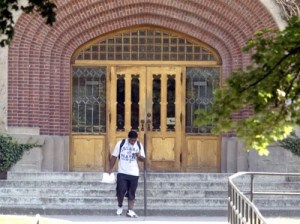
LeRhonda Greats joins Marietta Taylor to lead the discussion on Monday, December 6, 7:30 p.m. at Princeton Public Library conference room. Sponsored by Not in Our Town and the library, it is part of the series “Continuing Conversations on Race.” LeRhonda explains how the topic will be a follow-on to the November 3 lecture by Melissa Harris-Perry.
“The topic for our Continuing Discussion will follow-up on something that Professor Melissa Harris-Perry said about the rat in The Tale of Despereaux who talked about what it was like to have his name be a slur. A Newsweek article, “Black in the Age of Obama” highlights some differences that still occur even though President Obama is in the White House.
“The main focus of the discussion will be what it is like for men of color in the age of Obama. In the times of heightened security at the airports and the latest dismal reports highlight the challenges. Our discussion will center around possible solutions and the article about what colleges are doing right for black male students.”
Here are excerpts from, and links to, the articles:
It’s only at places like Princeton—selective, self-sufficient institutions that have spent many years (and millions of dollars) cultivating climate-controlled biospheres of diversity—that anything even remotely resembling a post-racial America is supposed to have taken shape.. . But living in a post-racial bubble—a place that expects everyone to have gotten over race—isn’t as easy as it looks, especially if you happen to be black. Excerpted from Newsweek’s “Black in the Age of Obama, April 18, 2009.”
As white male air travelers take up the cause of YouTube hero John “Don’t Touch My Junk” Tyner, a snicker of schadenfreude may be shared among working class and lower class men of color. They may well wonder why he revelation that pat-downs are a degrading imposition of power by government agents has taken such a long time to emerge. From David William’s article in TruthDig “Pat-Downs Hit Middle America Where it Counts.”
“A new documentary about black males and education, Beyond the Bricks, now touring the country, suggests that maybe we’re asking the wrong question. Maybe, instead of looking at black males who are falling by the educational wayside and asking what they and the schools they attend are doing wrong, we should be looking at the black males who are succeeding, and asking what the colleges they attend are doing right.” From Karl Reid’s November 19, 2010 article in The Griot.
Thanks go to the Princeton Public Library for offering these opportunities to have honest discussions on race-related issues of relevance to our community and nation.